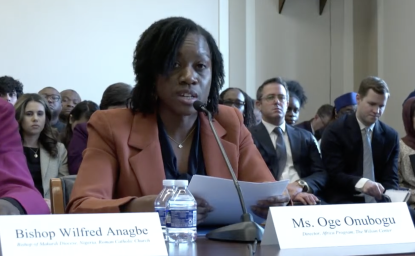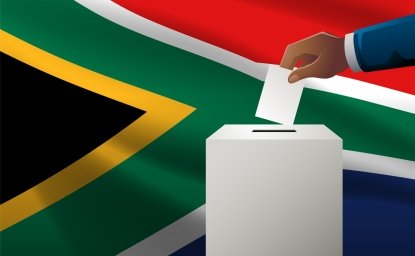Michel Noureddine Kassa is interviewed by the newspaper Le Potentiel (Kinshasa). Mr. Kassa is the Country Coordinator of the ILCCE, one of the Wilson Center's partners in the Democratic Republic of Congo (DRC).
1. You just organized a workshop for Congolese media leaders on decision-making and consensus building. What was the objective?
The objective of the workshop was to gather a small number of journalists from the capitol and other provinces, as well as leaders in the fields of observation, teaching or the media and invite them to a three-day interactive session. During the workshop, each participant was put in a leadership role and confronted with difficult choices. People had the chance to observe their own perceptions, listening skills, and informational processing.
2. Tell us about the ILCCE and of its previous initiatives?
The Initiative pour un Leadership Collaboratif et la Cohésion de l'Etat en RDC (ILCCE) was born in November 2005 out of the collective will of numerous Congolese actors, analysts, and two academic institutions: L'Institut de Recherche et d'Enseignement sur la Négociation en Europe (IRENE) based in Paris and headed by Professors Alain Lempereur and Aurélien Colson, and the Woodrow Wilson International Center for Scholars based in Washington, D.C. headed by Dr. Howard Wolpe. As for me, I took a break from the UN in order to get involved in what I consider to be a necessary and much needed step. This will add to my humanitarian journey in Zaire and Congo that lasted from 1995 to 2003. During that time, I felt that Congolese citizens, despite their differences, strongly desired cohesion, an aspiration that enabled especially the vulnerable and humble to maintain their unity throughout years of hell. This was the first time we have organized a training retreat for such a crowd (members of the media). Before, we were mostly inviting political leaders and influential actors working in certain provinces. The popularity of the initiative rests on the fact that in each of these retreats, we offered a series of methodological principals:
- First, the panels quickly realize that they are at the center of attention participating in the process itself, and are treated for what they are: adults with rich and unique experiences, not passive students.
- Next, the activities throughout the retreat are not representative of geographic limits but the product of wisdom and universal psychological experiences. Division and mistrust are universal attitudes that are often essential for survival, while cohesion and trust are human conceptions that demand an enormous effort everyday from Japan to the "Far West" and from the Norwegian Lapps to the South African Khoisans.
- Thirdly, the Congolese participants propose and select themes applicable to the DRC. Once gathered at the workshop, the actors often choose the most delicate questions and employ communication tools with a spirit of cohesion.
- Finally, other sessions follow the first retreat during which the participants will recognize their personal commitments and will reinforce their relationships either amongst themselves or within the larger network of participants.
3. For the previous training retreats, you invited certain leaders such as Olivier Kamitatu, Thomas Luhaka, Samba Kaputo, Lunda Bululu, General Boteti, Nzanga, Mobutu. Why these choices? What was your intent? What was the result?
You can also add Mabi Mulumba, Mbusa Nyamwisi, Azarias Ruberwa, the Mwami Kabare, Pastor Ngalasi, Me Mukendi, Wivine Nlandu, Jerome Kamate, Eugene Serufuli, Herold Sadiki, Petronille Vaweka and many others. These leaders possess an incredible influence on the opinion and consciousness of the population. The goal, especially during the period of animosity caused by electoral competition, was to restore a feeling of collective destiny, a sort of Congolese "barge" which must reclaim its normal course to escape a stormy patch: it can pitch but its passengers must consciously and constantly look after what does not capsize. During these workshops and afterwards, strong commitments are made by the political leaders that neither the media nor us hear about. That is the essential result. Only the political leaders and actors can tell you about these commitments and describe the way in which these workshops transformed a part of their perceptions and behavior.
4. The DRC is entering a post-conflict and post-election era. However, the political climate remains tense and fragile with pockets of conflicts in Goma-Masisi (North Kivu), in Bolobo in the Bandunu, and in Mekwa in Eastern Kasai. What are the priorities of the ILCCE? Are you ready to become involved there?
The ILCCE is three people and a driver! The ICCLE-WWICS-ESSEC IRENE team gets together for a few days per month to conduct the workshops. Moreover, there are national and local structures that are active on the ground and equipped to deal with the problems you raised. However, whenever possible, we try to answer questions or concerns brought up by our previous participants. This happens whenever we feel that two divided parties need a mediator to ensure neutrality
.even if the latter is from Mars! The real objective we are pursuing is an academic anchorage that will allow 4 or 5 Congolese institutions to familiarize themselves with a methodology and in turn be enriched with an organic understanding of cohesive mechanisms specific to each Congolese community.
5. At the end of your capacity-building initiatives for Congolese political leaders in areas of analysis and perception, what are the diagnostics and paths toward solutions considered? A message to the political class?
The first essential fact is a common love for the Congo beyond rivalries with more or less noble attitudes and arguments. I repeat this point because I have personally experienced it during these key moments of the last ten years from Bunia to Gemena or Mbandaka and from Goma to Ankoro or Minembwe. Leaders followed the determination of the Congolese people "from the bottom" to preserve the unity of their country.
2007 will be a historic test for Congo and its place in the world: about 80 million ballots were deposited in the boxes since last year in a referendum and four elections! 80 million expressed a will to affect the course of things in their country. Among the expected changes, the most fundamental will be that of leadership at all levels and sectors of national life. A leadership that will make decisions based on the consultation and equity of different arguments and interests. Active listening and the feeling that society can progress if its members realize that their individual or familial success rests on making daily compromises, and not on the defeat of the other! Only voluntary trust can lift Congolese society and its leaders out of this persistent and deep-rooted mistrust. This is not restrictive to the Congo: our workshops are abounding with examples that we take home to our respective countries! Why would the press not cover, with the expertise of specialized Congolese institutions, three indications of the evolution of "physical, economic, and civic trust" for the coming years and months:
• How protected do people feel by the army and police?
• How capable do they feel to run up credit, begin a business or initiative (without the fear of exorbitant rates, of community-based bias with loans, and of the need for favors)?
• How much do they feel the "blood" of the country's resources running through their veins? In other words, do they see public resources as serving more consistently and regularly personal and familial projects?
12/06/06
Le Potentiel (Kinshasa)




